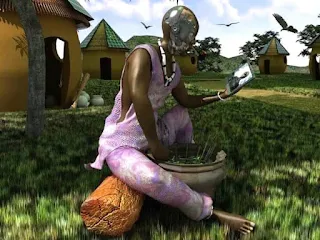(toc) #title= (Table of Content)
Introduction
Jean-François Amon d’Aby (b. 1913, Côte d’Ivoire) holds a foundational place in the history of modern Ivorian drama. Though not widely known outside specialist circles, Amon d’Aby’s contributions laid crucial groundwork for the growth of local theater and the preservation and reinterpretation of Côte d’Ivoire’s rich oral traditions. Both a playwright and a cultural advocate, he devoted his life to blending indigenous storytelling with modern dramatic forms, carving out a distinct Ivorian voice in the realm of African theatre.
Early Life and the Birth of Ivorian Theater
Born in 1913, Amon d’Aby came of age during a period of significant cultural and political transformation in colonial West Africa. In 1938, he joined forces with Germain Coffi Gadeau to establish Le Théâtre Indigène de la Côte d’Ivoire (TICI). At a time when African cultural expression was often marginalized under colonial rule, TICI became a bold platform for nurturing local drama, performance, and storytelling rooted in the Ivorian experience.
Building Cultural Institutions
Amon d’Aby’s commitment to cultural development did not stop with TICI. In 1953, he teamed up again with Germain Coffi Gadeau and the renowned writer Bernard Dadié to found the Cercle Culturel et Folklorique de la Côte d’Ivoire (CCFCI), a club devoted to promoting Ivorian culture and folklore.
He was also an active member of the Jeunesse Ouvrière Chrétienne (JOC) — the Young Christian Workers’ Association — which provided another platform for his creative output. Through these groups, Amon d’Aby built vibrant networks that brought theater to communities and fostered a national cultural consciousness at a time when Côte d’Ivoire was still under French colonial rule.
A Prolific Playwright and Moral Teacher
Over his career, Amon d’Aby wrote more than a dozen plays for these cultural associations — seven for the JOC, three for TICI, and four for the CCFCI. His plays addressed a wide range of themes that combined cultural affirmation with moral instruction.
Themes and Social Critique
Amon d’Aby’s dramatic works are known for presenting traditional cultural motifs alongside Christian values. His plays often deliver lessons in moral and social virtue, calling for ethical reform within Ivorian society. He used drama as a tool to challenge what he saw as harmful aspects of traditional practices, including attacks on so-called fetishists and charlatans who exploited local beliefs for personal gain.
By weaving Christian ethical principles with indigenous performance forms, Amon d’Aby offered audiences not only entertainment but also a vision for societal progress grounded in faith and cultural pride.
From Oral Tradition to Modern Forms
Amon d’Aby’s early works drew deeply from Côte d’Ivoire’s rich oral storytelling tradition, echoing the communal performances, folktales, and ritual dramas that have long been the bedrock of West African cultural life.
However, as his career progressed, his secular theater evolved. He began to incorporate techniques borrowed from European theatrical models, blending indigenous narrative forms with new dramatic structures and staging practices. This creative synthesis helped modernize Ivorian drama while retaining its local flavor, making his plays accessible to both rural and urban audiences.
Beyond the Stage: Ethno-Sociology and Folktales
Amon d’Aby’s dedication to cultural preservation extended beyond playwriting. He also authored three important ethno-sociological studies that shed light on Ivorian customs and social structures, offering valuable insights into the country’s cultural fabric during the colonial and early postcolonial periods.
In addition, he published several collections of folktales and legends, preserving traditional stories for future generations. These works serve as both scholarly resources and a testament to his lifelong commitment to championing Côte d’Ivoire’s oral heritage.
Legacy and Impact
Though Jean-François Amon d’Aby may not be a household name internationally, his impact on Ivorian cultural life is enduring. By founding organizations like TICI and CCFCI, he helped create institutional support for local artists and performers at a time when such support was scarce.
His plays, rooted in indigenous wisdom yet open to modern influence, laid the groundwork for later generations of Ivorian playwrights and performers. The themes he tackled — from cultural identity to moral integrity — remain relevant in contemporary conversations about how African societies negotiate tradition and modernity.
Conclusion
Jean-François Amon d’Aby’s life and work stand as a reminder that cultural pioneers often work behind the scenes, sowing seeds that blossom long after they are gone. Through his pioneering theater, social critique, and documentation of folklore, he ensured that Côte d’Ivoire’s stories would not only survive but continue to evolve. In doing so, Amon d’Aby secured his place as one of the founding figures of Ivorian modern drama — a true bridge between past traditions and modern theatrical expression.

Leave a comment behind